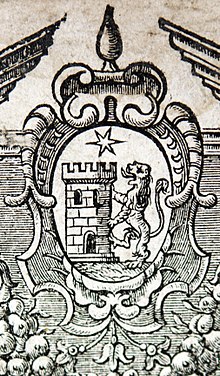 Coat of arms (Printer's Mark) of Immanuel Benveniste, Amsterdam, 17th century. It includes the Star of David, a lion cub of Judah, a castle and 10 moons - the Kabbalist symbols of the 10 Sefirot (attributes/emanations). Probably the symbols in the coat of arms of Mendes/Benveniste families from Portugal and Spain.[1] | |
| Origin | |
|---|---|
| Language(s) | Spanish, Sephardi |
| Meaning | Italian "Bene veniste" and Spanish Bien venida = welcome (or Bien viniste = your arrival was good). |
| Region of origin | Spain, Greece, Israel, Turkey, Ottoman Empire, Western Europe |
| Other names | |
| Variant form(s) | Benvenuto and Benveniste (in Italy), Benvenist (in Catalonia), Benveniste (in Castile), Bemvenist and Bemveniste (in Portugal), Beniste or Benisti (in North Africa), Bienveniste, Benbeneste, Beneviste, Benvenista, Benvenisto, Ben-Veniste. |
The Benveniste family is an old, noble, wealthy, and scholarly Sephardic Jewish family of Narbonne, France, and northern Spain established in the 11th century. The family was present in the 11th to the 15th centuries in Hachmei Provence, France, Barcelona, Aragon, and Castile.
Family members received honorary titles from the authorities and were members of the administration of the Kingdoms of Aragon and Castile. They were the baillie ("bayle")—the tax officers and treasurers, and alfaquim—senior advisors to the king and royal physician in Barcelona and Aragon in the 12th and 13th centuries. They held the title of "nasi" (prince in Hebrew), since they are considered by the Jewish tradition as descendants of King David and members of the House of David in the Jewish communities (mainly Barcelona) and were prominent religious and secular leaders in the 11th to the 14th centuries.
In the 14th to the 15th century, they held the titles of "Benveniste de la Cavalleria"—"of the knights" (a name given by the Knights Templar to their treasurers and tax collectors) and “don”—a noble person in Aragon and Castile. In the aftermath of the massacres of Jews which began in Spain on 6 June 1391, some such as the de Cartagena family converted to Christianity and became powerful conversos in Burgos. After the expulsion of the Jews from Spain in 1492, non-converts were dispersed mainly to Portugal, Greece - Salonica, other parts of the Ottoman Empire, and North African countries. In Portugal, they were forced to convert to Christianity in 1497 and became some of the richest traders and bankers (the Mendes family) of Europe. Today, the name is borne by families in Europe, the Americas, Asia, and Israel. It was also used as a prænomen.[2]
- ^ Heller Marvin J. The Printer's Mark of Immanuel Benveniste and Its Later Influence, Studies in Bibliography and Booklore, Vol. 19, (1994)
- ^ Moritz Steinschneider, "Cat. Bodl." No. 7348; Loeb, in "Rev. des Etudes Juives", xxi. 153